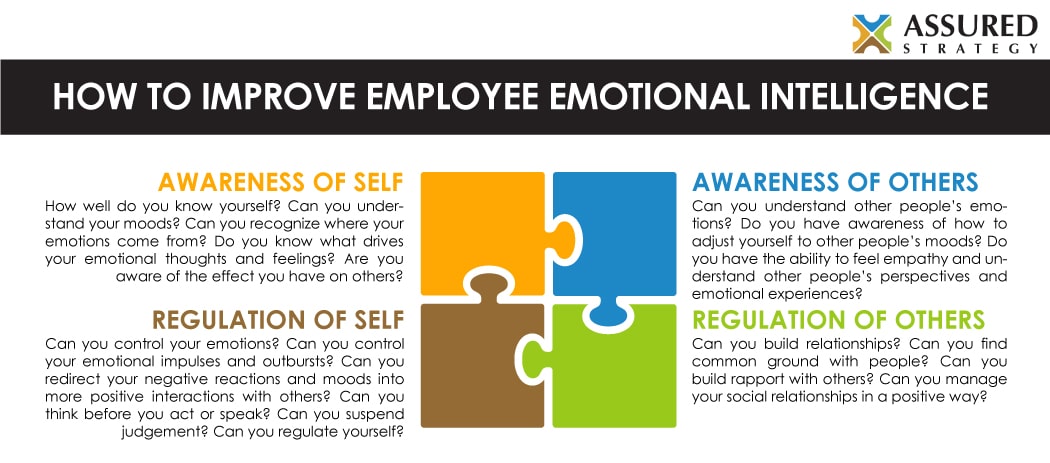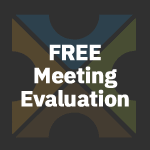
Emotional Intelligence (EQ) is a catch phrase that is thrown around in leadership circles and generally means you have the ability to emotionally understand yourself and others and manage social situations well. My personal bias is that successful leaders need to have strong EQ to be effective in managing employees and maximizing the people talent within an organization, but what about the EQ of employees? Does the success of an employee correlate with their level of EQ?
Emotional Intelligence can be conceptualized in 2 primary skills, Awareness (thoughts) and Regulation (behavior), both within one’s self and socially with others. It boils down to one’s ability to have insight and use that insight to control negative behavioral impulses and channel that insight in a controlled manner into positive social behaviors.
- Awareness of Self: How well do you know yourself? Can you understand your moods? Can you recognize where your emotions come from? Do you know what drives your emotional thoughts and feelings? Are you aware of the effect you have on others?
- Awareness of Others: Can you understand other people’s emotions? Do you have awareness of how to adjust yourself to other people’s moods? Do you have the ability to feel empathy and understand other people’s perspectives and emotional experiences?
- Regulation of Self: Can you control your emotions? Can you control your emotional impulses and outbursts? Can you redirect your negative reactions and moods into more positive interactions with others? Can you think before you act or speak? Can you suspend judgement? Can you regulate yourself?
- Regulation of Others: Can you build relationships? Can you find common ground with people? Can you build rapport with others? Can you manage your social relationships in a positive way?
An employee’s ability to have emotional awareness and work well with others on the team directly impacts a company’s ability to achieve their goals. A leader only has so much time and energy. Are you spending your time on employee social drama or on achieving company objectives?
Here are the steps to help employees gain greater EQ.
- Awareness of Self: Use psychometric profiles like the DISC, Values and Attribute Indexes to help employees gain self-awareness. Don’t be afraid to talk about emotions. Help employees gain awareness around what triggers them, what the thoughts were that led to a negative behavior impulse, what emotions and negative concepts they experienced the situation from. Everyone has baggage, awareness of how that baggage impacts the here and now is critical.
- Awareness of Others: Help facilitate conversations that allow for employees to share their experience and ask employees to rephrase what their co-worker said and must have felt. Again, don’t be afraid to talk about emotions. By practicing active listening skills used with others, employees can begin to listen for and try to understand someone else’s experience.
- Regulation of Self: If a workplace conflict has occurred, help employees talk about the impulses they had and if they acted on these impulses or controlled themselves. Talk about the need to pause and not automatically respond in a situation that triggers them. Discussing this and practicing this will help improve self-control and self-management skills vital in fostering healthy team dynamics.
- Regulation of Others: Ask employees to talk about how they get along with others. Do they cause unnecessary drama? Are they generally liked by their peers or do they have social challenges in building strong healthy relationships? An employee’s ability to understand their impact in the social network of a company is helpful so they understand if they are a social asset or a social liability.
The bottom line is, not only do leaders need to have strong EQ themselves, but their ability to support healthy EQ in their employees is a critical skill. Lean into emotional intelligence.
Understanding an employee’s behavior profile can be a first step. DISC is a great behavior profile tool that allows you to improve communication and your effectiveness at work.







